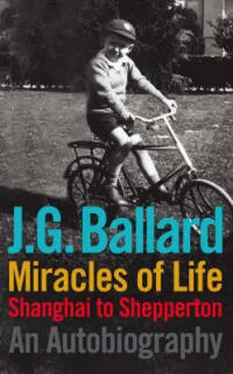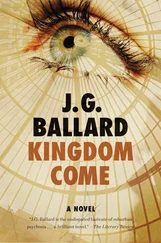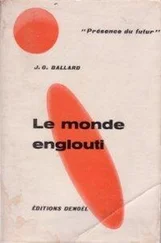Then there were the Chums and Boy’s Own Paper annuals, aggressive compendiums of patriotic derring-do. A.A. Milne and the Just William series together portrayed a mythical middle-class England, a Home Counties, Peter Pan world far more remote from reality than Life and Time were from the realities of American life. However, it seemed to be confirmed by the British doctors, architects, managers and clergymen I met in Shanghai. They might have driven American cars and had American refrigerators, but in speech and manner they weren’t too far from the doctors and schoolmasters I came across in my reading.
All this gave the British adults in Shanghai a certain authority, which they lost completely a few years later after the sinking of the battleships Repulse and Prince of Wales and the surrender of Singapore. The British lost a respect which they never recovered, as I discovered when Chinese shopkeepers, French dentists and Sikh school-bus drivers made disparaging remarks about British power. The dream of empire died when Singapore surrendered without a fight and our aircraft proved no match for the highly trained Zero pilots. Even at the age of 11 or 12 I knew that no amount of patriotic newsreels would put the Union Jack jigsaw together again. From then on I was slightly suspicious of all British adults.
My closest friends were an English family called the Kendall-Wards, who lived at the far end of Amherst Avenue, and were a happy exception to every rule of expatriate English life. During the holidays I would cycle over and spend most of the day with them. There were three brothers, whom I remember well, but it was the parents who made a powerful and lasting impact on me. Mr Kendall-Ward was a senior executive with the Shanghai Power Company, but he and his wife were free spirits who rarely mixed on a social level with other British residents. The father was a model railway enthusiast, and the enclosed veranda on the first floor, a room some thirty feet long, was filled with a vast landscape of tunnels, hills, villages, lakes and railway lines, laid out on a waist-high platform fitted with trapdoors through which he would emerge without warning to make some track adjustment. Once he had filled this huge space he began to colonise the nearby rooms off the veranda, building narrow ledges around the walls which carried the miniature railway lines ever deeper into the house.
Mrs Kendall-Ward presided over this friendly chaos, welcoming and cheerful, surrounded by four Airedale dogs, nursing a new baby and asking me about the latest news from downtown Shanghai. She listened with apparent interest as I told her in detail about a new French or Italian warship moored off the Bund. She spoke fluent Chinese to the amahs, an unheard-of skill that amazed me, and addressed them by their names. Uniquely among Shanghai residents, she employed only women servants, some six or seven amahs. According to my mother, this was an act of charity on the Kendall-Wards’ part – these middle-aged spinsters would otherwise have found it difficult to survive.
The Kendall-Ward home was the complete opposite of 31 Amherst Avenue, and an influence that has lasted all my life. My mother was amiable but distant with any friends I brought home. Relations between parents and children were far more formal in the 1930s and 1940s, and our house reflected this, an almost cathedral-like space of polished parquet floors and blackwood furniture. By contrast the Kendall-Ward home was an untidy nest, full of barking dogs, arguing amahs and the sound of Mr Kendall-Ward’s power saws slicing though plywood, the three brothers and myself roller-skating through the rooms and generally running wild. I knew that this was the right way to bring up children. Appearances counted for nothing, and everyone was encouraged to follow their own notions, however hare-brained. Mrs Kendall-Ward openly breastfed her baby, something only Chinese women did. If she was driving us around Shanghai in the family Packard, and stopped to buy American comics for her sons, she always included a comic for me, something I noticed that neither my own mother nor any of the other English mothers ever did. Her kindness and good nature I remember vividly seventy years later. I was rarely unhappy at home, but I was always happy at the Kendall-Wards, and I think that I was aware of the difference at the time.
2
Japanese Invasion (1937)
In 1937 the street spectacle that so enthralled a small English boy was bathed in a far more chilling light. Led by its military chiefs, and with the silent blessing of the Emperor, Japan launched a full-scale invasion of China. Its armies seized all the coastal cities, including Shanghai, though they did not enter the International Settlement. For several months there was bitter fighting in the outlying areas of the city, especially the Chapei and Nantao suburbs. Relentless Japanese bombing and naval bombardment from their warships in the Whangpoo river levelled large areas of Shanghai. For the first time in the history of warfare a coordinated air, sea and land assault was launched against Chiang Kai-shek’s Chinese armies, who greatly outnumbered the Japanese, but were poorly led by corrupt cronies of Chiang and his wife.
One bomb, dropped by accident from a Chinese aircraft, struck the Great World Amusement Park near the racecourse in the heart of the International Settlement, which was filled with refugees from the outlying districts. The bomb killed a thousand people, at the time the largest number of casualties ever caused by a single bomb. The Chinese pushed the Japanese back towards the river, until they were fighting from trenches that filled with water at high tide. But the Japanese prevailed, and Chiang’s armies withdrew into the vast interior of China. The new national capital became Chungking, 900 miles to the west.
There was desperate fighting in the open countryside only a mile from our home. At one point artillery shells from the rival Chinese and Japanese batteries were passing over our roof, and my parents closed the house and moved with the servants to the comparative safety of a rented house in the French Concession.
Curiously, the house we moved to had a drained swimming pool in its garden. It must have been the first drained pool I had seen, and it struck me as strangely significant in a way I have never fully grasped. My parents decided not to fill the pool, and it lay in the garden like a mysterious empty presence. I would walk through the unmown grass and stare down at its canted floor. I could hear the bombing and gunfire all around Shanghai, and see the vast pall of smoke that lay over the city, but the drained pool remained apart. In the coming years I would see a great many drained and half-drained pools, as British residents left Shanghai for Australia and Canada, or the assumed ‘safety’ of Hong Kong and Singapore, and they all seemed as mysterious as that first pool in the French Concession. I was unaware of the obvious symbolism that British power was ebbing away, because no one thought so at the time, and faith in the British Empire was at its jingoistic height. Right up to, and beyond, Pearl Harbor it was taken for granted that the dispatch of a few Royal Navy warships would send the Japanese scuttling back to Tokyo Bay. I think now that the drained pool represented the unknown, a concept that had played no part in my life. Shanghai in the 1930s was full of extravagant fantasies, but these spectacles were designed to promote a new hotel or airport, a new department store, nightclub or dog-racing track. Nothing was unknown.
Once the Chinese armies had withdrawn, life in Shanghai resumed as if little had changed. The Japanese surrounded the city, but made no attempt to confront the contingents of British, French and American soldiers, or to interfere with their warships in the river facing the Bund. The Japanese cruiser Idzumo , a veteran of the Great War, sat in midstream, but Shanghai’s hotels, bars and nightclubs were as busy as ever.
Читать дальше






